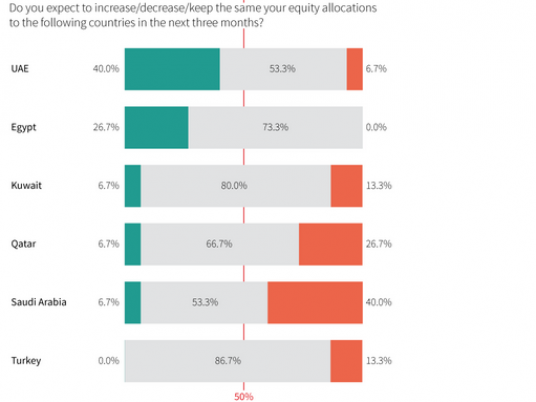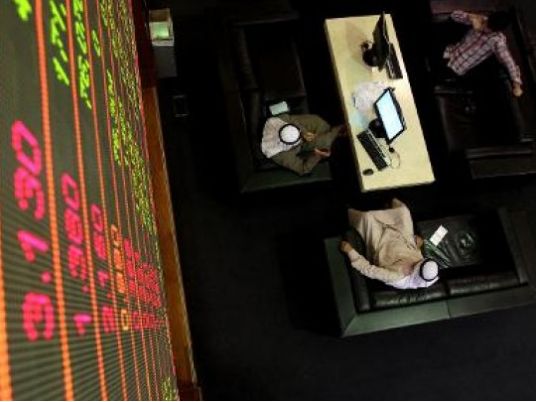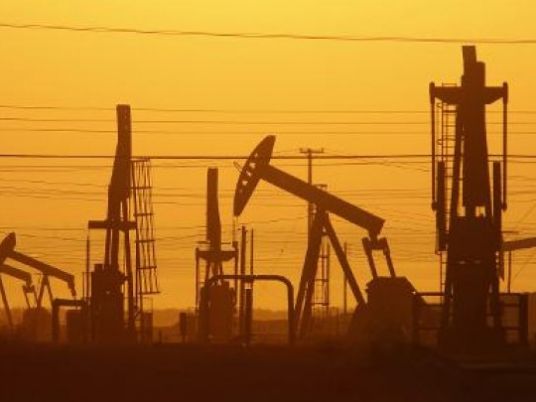
Middle East fund managers have on balance turned negative towards the region and especially its biggest equity market, Saudi Arabia, after oil prices gave up most of the gains made in the last six months, a monthly Reuters survey shows.
The survey of 15 leading investment firms, conducted over the past three days, shows only 13 percent expect to raise their equity allocations to the Middle East in the next three months,while 20 percent expect to reduce them.
Last month, fund managers were neutral on balance towards regional equities, with 7 percent intending to increase equity allocations and the same number expecting to cut them.
Oil, one of the main factors watched by investors in the region, has been falling sharply on worries about oversupply and a meltdown in Chinese equities. Brent crude hit a session trough of $52.28 on Tuesday, its lowest since Feb. 2.
"One of the fatal factors determining the flow of investments in the region is oil; we are talking about an oil price less than 50 percent of where it was a year earlier," said Tamer Mostafa, head of asset management at Union National Bank in the United Arab Emirates.
"Definitely that factor had a heavyweight effect on most GCC (Gulf Cooperation Council) countries as well as some countries in North Africa."
Heavy state spending in GCC countries has kept economic growth in the region strong. But as oil's slump has continued, governments have started to cut back on some projects and reduce consumer subsidies – the UAE deregulated domestic fuel prices this week – and that has affected investor sentiment.
"Going forward, investors should adapt their strategies according to the current oil price levels and focus on fundamentals and companies' growth plans rather than applying a top-down approach across the board," Mostafa said.
<———————————————————-
———————————————————->
SAUDI
Fund managers are especially bearish on Saudi Arabia: 40 percent expect to cut equity allocations there in the next three months and just 7 percent to increase them. This compares with 27 percent intending to decrease allocations and 13 percent to increase them in June.
Petrochemicals are the second-biggest sector by market capitalisation on the kingdom's stock market and most of those companies posted sharp profit declines in the second quarter as cheaper oil dragged down prices of oil products and chemicals.
While the Saudi government has continued to spend heavily this year, many economists view that as unsustainable in the long run and expect some retrenchment next year, which could slow economic growth.
Also, Saudi Arabia is the most expensive market in the region measured by price-to-earnings ratios. The main Saudi index trades at 16 times projected 2015 earnings, roughly the same as the Dow Jones Industrial Average and FTSE 100 ; other Gulf bourses are between 11 and 13.
One reason for the high valuations was local investors'expectations for large foreign fund inflows when the market opened to direct foreign investment by qualified institutions in mid-June.
But in the last six weeks, inflows have been tiny, partly because of strict regulations. One foreign institution, HSBC, obtained a licence to invest but it is not clear whether it has been joined by any other institution; the Capital Market Authority has not announced any licence awards.
According to Reuters calculations based on stock exchange data, direct foreign fund inflows so far have only amounted to about $3.3 million – a drop in the ocean for a market with a capitalisation of $537 billion.
UAE, EGYPT
Fund managers are relatively positive on the United Arab Emirates, which looks best positioned to act as a hub for trade with and investment in Iran if sanctions against Tehran are lifted after this month's international agreement on the Iranian nuclear programme.
Also, Dubai is less exposed to oil than other Gulf markets because of its diversified economy, although it is not insulated from an indirect impact such as lower spending by tourists from neighbouring countries.
Forty percent of managers expect to increase equity allocations to the UAE, up from 33 percent a month ago, and only 7 percent expect to cut them, the same as in the previous survey.
"We see good value in the UAE and it could benefit from Iran," said Bader Ghanim al-Ghanim, executive vice president and head of regional asset management at Kuwait's Global Investment House.
Another favourite of fund managers is Egypt which, trading at 11 times 2015 earnings, is one of the cheapest markets in the Middle East, having dropped by almost a quarter between its peak in February and a trough in early July.
Twenty-seven percent of respondents expect to increase their Egyptian equity allocations and none to cut them. Last month, the same number of respondents said they planned to increase allocations and 7 percent saw them lower.
Egypt is a net importer of energy and cheaper oil has helped the Cairo government manage its budget deficit by reducing costly fuel subsidies.
Gulf bond spreads have continued to perform strongly in recent weeks. Nevertheless, funds are on balance negative towards Middle East fixed income as the start of U.S. interest rate hikes looms, the survey showed.
None of the respondents expects to raise allocations to fixed income and 20 percent expect to cut them, compared to 7
percent positive and none negative in the last survey.
SURVEY RESULTS
1) Do you expect to increase/decrease/keep the same your overall equity allocation to the Middle East in the next three
months?
INCREASE – 2 DECREASE – 3 SAME – 10
2) Do you expect to increase/decrease/keep the same your overall fixed income allocation to the Middle East in the next
three months?
INCREASE – 0 DECREASE – 3 SAME – 12
3) Do you expect to increase/decrease/keep the same your equity allocations to the following countries in the next three
months?
a) United Arab Emirates
INCREASE – 6 DECREASE – 1 SAME – 8
b) Qatar
INCREASE – 1 DECREASE – 4 SAME – 10
c) Saudi Arabia
INCREASE – 1 DECREASE – 6 SAME – 8
d) Egypt
INCREASE – 4 DECREASE – 0 SAME – 11
e) Turkey
INCREASE – 0 DECREASE – 2 SAME – 13
f) Kuwait
INCREASE – 1 DECREASE – 2 SAME – 12
NOTE – Institutions taking part in the survey are: Ahli Bank Oman; Al Rayan Investment LLC; Al Mal Capital; Amwal Qatar; Arqaam Capital; Emirates NBD; Global Investment House; Invest AD; National Bank of Abu Dhabi; NBK Capital; Rasmala Investment Bank; Shuaa Asset Management; Schroders Middle East; Securities and Investment Co of Bahrain; Union National Bank.


